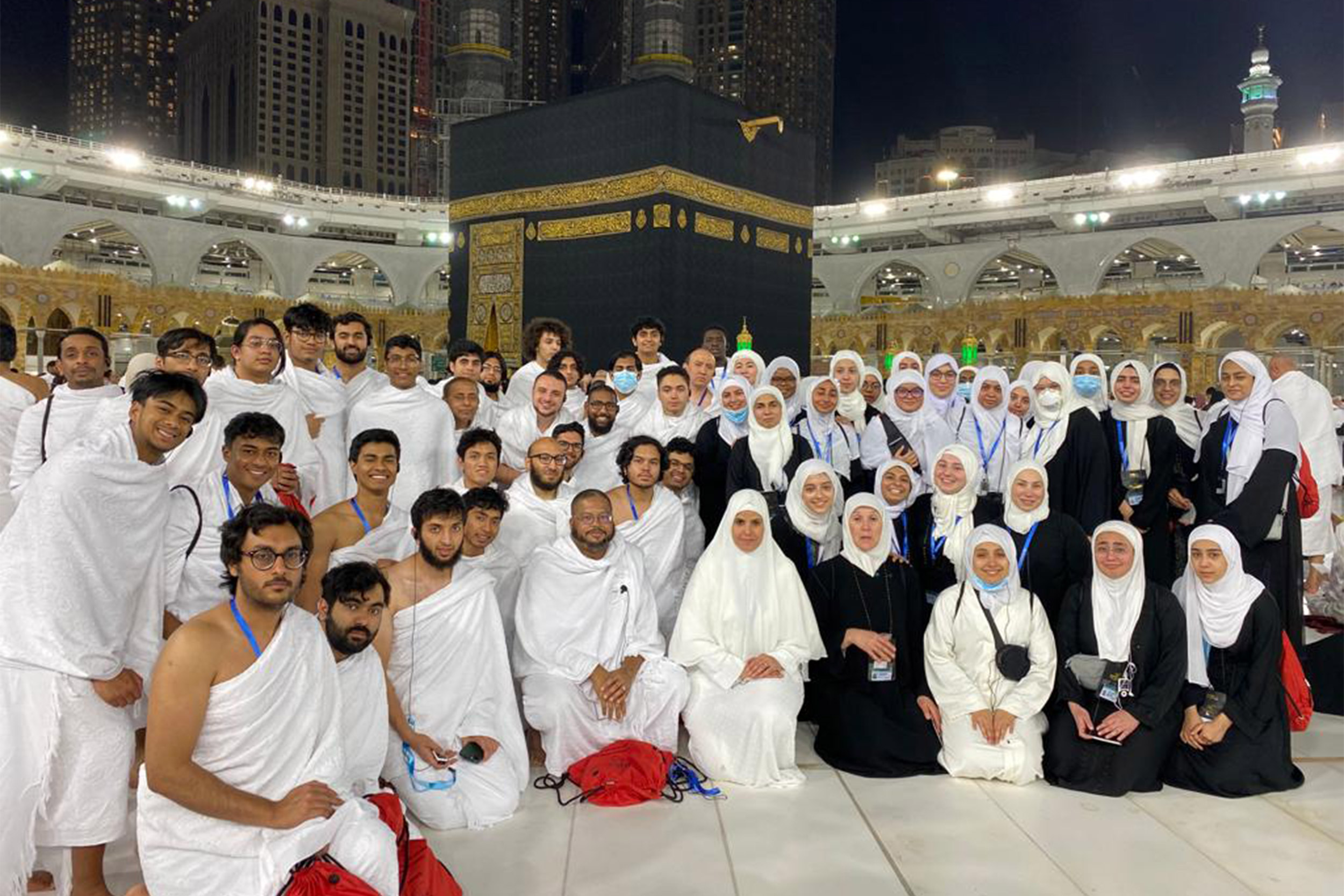
Participants from the 2023 Umrah trip gathered in front of Islam’s holiest site, the Kaaba, in Mecca, Saudi Arabia.
Photo courtesy of Chaplains Khalil Abdur-Rashid and Samia Omar
‘Renewed and enlightened’
Harvard group returns from its second Umrah trip
A group of Harvard students and family members recently returned from a Umrah pilgrimage to Mecca and Medina. According to University Muslim Chaplains Khalil Abdur-Rashid and Samia Omar, who planned and co-led the second such University trip to Saudi Arabia, it was a tremendous success.
Like the Hajj, the grand pilgrimage that all Muslims are expected to complete once during their lifetime, the Umrah is a spiritual journey to the sacred city of Mecca. Dubbed the “minor pilgrimage,” it involves the same core religious rites as the Hajj but requires less time and can be performed at any time of year.
Abdur-Rashid and Omar led 31 participants on Harvard’s inaugural Umrah trip in 2019. Funded by a donor who pledged annual support for 30 students to take the trip, it involved months of coordination with travel and visa agencies, the Schools, central University travel and health offices, and Saudi ministries. The resulting 10-day visit went off without a hitch.
In 2020 things did not go as smoothly. Scheduled for late January, the trip had to be canceled at the last minute as the COVID-19 pandemic began to sweep the globe — a blow for the chaplains and students who were just about to depart.
But for many of them, the opportunity came again this January. The group welcomed 69 participants, including 32 College students and several graduate students, alumni, and family members, many of whom had originally been scheduled for 2020. The opportunity to include family members like her mother, Dina Kobeissi ’24 said, was particularly special: “There aren’t many Harvard memories we share with our families other than maybe parents’ weekend or graduation, so for the trip to have parents and siblings made it so much more valuable and memorable for my Harvard experience.”
On Jan. 4, the group flew from Boston to Medina. They were greeted on arrival by representatives of Saudi’s Ministry of Hajj and Umrah with music, perfume, dates, and a shower of rose petals. They spent four days in Medina, where the Prophet Muhammad lived and died, visiting its sacred mosque and his grave.
“In the Western media, we constantly hear comments about how women in Islam are oppressed and stripped of their voices, and as a woman, I have always felt the responsibility to prove these comments wrong and to defend my identity and religion …”
Iqra Noor ’23
Pilgrimages are gendered, with certain spaces exclusively for women and others for men. At one point in Medina, students split into male and female tour buses, and the chaplains led tailored discussions for each. For Iqra Noor ’23, Omar’s bus lectures on female empowerment were a revelation. “In the Western media, we constantly hear comments about how women in Islam are oppressed and stripped of their voices, and as a woman, I have always felt the responsibility to prove these comments wrong and to defend my identity and religion … After so long, I felt grateful and humbly proud of being a Muslim woman,” she said.
Next, the group traveled to Mecca to perform the rite of circumambulating and praying around the Kaaba, the first Islamic house of worship, built by Abraham and Ishmael. They walked the ancient trail between the hills of Safa and Marwa and drank from its well — an act of devotion to Hajar, Abraham’s second wife, who desperately searched for water in the hills before God blessed her with an overflowing well. The pilgrimage concluded with trimming or shaving the hair, signifying absolution and spiritual rebirth.
They spent the remainder of their trip visiting sites of interest, such as the factory that produces the sacred black cloth draped over the Kaaba each year. They also had the opportunity to attend the Hajj 2023 Expo and engage in discussions with Medina’s deputy governor and members of the ministry, providing direct feedback on improving the Umrah experience for pilgrims worldwide.
For Omar, Umrah presented an opportunity to “connect students to their faith tradition in a healthy, positive, and constructive way” and to take time for introspection amid the anxieties of everyday life. “Living as a religious minority has its impact on the self-esteem and psyche, and to be able to take our students to an environment where they no longer feel and live as minorities is empowering,” she said.
Abdur-Rashid noted that the trip also offered students the opportunity to meet people from around the world, adding to their experience as global citizens. “When they return to campus, they return renewed and enlightened, [ready to] engage in and contribute to campus life in a more mature and meaningful way.”
The students agree. Noor said, “Those 10 days comprised of not only learning and connecting with my religion but also reflecting on my past self and truly becoming aware of my present self and my day-to-day actions and habits … realizing that life is meant to be lived for something bigger than just ourselves.”
For Kadijatou Diallo, M.P.P. ’22, the trip was an awakening, helping her “reconnect spiritually to Allah in a way I feared I [had] lost but was so lucky to rediscover and continue cultivating. It also was a reminder that I’m part of a larger community, beyond religious affiliation, and I have a responsibility to ‘show up’ and work for the betterment of the collective. It’s important that Harvard has space for students to develop their spiritual lives alongside their intellectual, and I’ll always be grateful to the chaplain’s office for giving me this opportunity.”




